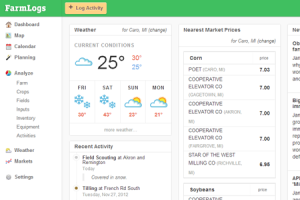It’s hard to imagine revolutionizing an industry as massive as agriculture with just $1 million in venture capital seed funding. But that is basically the plan at FarmLogs, an Ann Arbor, MI-based startup that aims to bring the power of mobile devices, cloud computing and Big Data to farmers working the field.
“Obviously it’s risky in some ways because you never know how long adoption will take,” says Tim Streit, a managing director at Huron River Ventures, which co-led a seed funding round that raised $1 million for FarmLogs. “I get excited because its an incredibly large industry that is lagging many other industries in adoption of new technology. Some farmers are using 100-year-old technology to manage their operations.”

Co-founder Jesse Vollmar, left and investor Tim Streit of Huron River Ventures.
FarmLogs was founded in January 2012 with about $170,000 from Y Combinator and a three-month residency at the seed fund’s home base in Mountain View, Calif. Co-founders Jesse Vollmar and Brad Koch developed the initial version of a web- and cloud-based application that lets farmers track everything they’ve planted, all the herbicides and fertilizers they’ve applied, all their business costs, and weather data and crop futures
After their stint in California, Koch and Vollmar brought the company back home to Michigan, where they soon met Streit, whose office sits a few blocks away in Ann Arbor. The subsequent funding round led by Huron River Ventures and Hyde Park Venture Partners, a VC firm in Chicago, will help FarmLogs add further functions to its application and improve its data analysis capabilities. The company recently hired its fifth employee, who will focus on online marketing.
A number of farms already have started using FarmLogs, though Vollmar declined to say how many. They range from small operations to some of the largest farms in the U.S., with up to 40,000 acres, Vollmar says.
The hope is to replace two inefficient forms of tracking technology. The first is paper. One of FarmLogs’ new customers is a farmer whose seeds failed. He could have gotten reimbursed from the seed company, but he lost the notebook that tracked where those specific seeds were planted. The mistake cost him $30,000, Vollmar says.
At the other end of the spectrum, farmers for years have bought sophisticated software delivered to them by CDs to track their operations. The programs cost about $750 apiece, Vollmar says, and many are so complex that some farmers abandon them, even after paying for extra training in how to use them.
Because these programs are stuck on a computer back at home or in the farm office, there’s no way for farmers to update the data as they’re working in the fields, or to easily share it with their partners and employees. By basing its new apps on on the web, FarmLogs hopes to make farm management simpler, portable and sharable.
And hopefully cheaper, too: FarmLogs currently charges $0.05 per acre monthly or $0.50 per acre yearly.

Farmlogs Dashboard
“They’re wicked-smart,” says Guy Turner, managing director at Hyde Park Venture Partners. “And most importantly, they understand the space. If it was just two random kids out of Stanford trying to revolution agriculture, well O.K. These guys grew up in and around farms, and they know the technology needs.”
The web-based platform means many additional revenue streams are possible, Vollmar says. Since the data is stored in the cloud, FarmLogs can constantly monitor it to develop new predictive algorithms for things including crop yields, profit margins and data-driven reports. The company could offer farmers ads targeted directly to their crop needs, plus detailed weather information.
“We enable greater efficiency by letting multiple people access the data at once from right out in the field” says Vollmar.
Five years ago, a company like this may not have been possible. Most farmers did not own mobile tablets. Many farms still had limited cellular coverage. Vollmar got his start in programming because his family was trying to hack Google’s calendar service for their farm management needs, developing a complicated system of shorthand to squeeze information into the program, which still strained under the load.
As rural cell service has improved, a new generation of farmers has grown up integrating iPads into their everyday lives, says Turner.
For the investors, where might all this lead? Streit believes FarmLogs could grow into its own large, standalone company, a kind of Bloomberg for the ag industry. Guy Turner of Hyde Park Venture Partners believes that an exit by way of acquisition is a much more likely outcome.“I think they are a future strategic acquisition target, is my bet,” Turner says.
Even though it’s a relatively new area, ag-tech is booming with new interest and funding from investors. That surge has been helped by plenty of major media coverage, including a story by Forbes magazine and another on FarmLogs in The New York Times.
The biggest and most obvious competitor for FarmLogs, Vollmar says, is Apex Farm Management Software from John Deere. Used by farmers for years as a hard-wired system with proprietary gadgets including John Deere-branded displays, receivers and machinery guidance systems, Apex announced last November that it will begin offering its services via mobile apps.
There’s also FarmWorks software, which offers its own line of devices for the field, office and farm vehicle. The company’s products are powerful and sophisticated, so much so that it must offer farmers training sessions, which cost $125 per person per day. The company also recently introduced a mobile app with limited data applications focused mostly on mapping. One company with an all-mobile business model quite similar to FarmLogs is FarmerOn, but it is focused entirely on dairy farms.
“There’s a few competitors and I’m sure there will be many more,” Vollmar says. “That said, we think of ourselves as pioneers. We don’t see anyone else that has established dominance yet.”
Looking to invest in ag-tech? In addition to Apex, FarmWorks and Farmeron mentioned earlier, other notable online agriculture companies include Farmers Web, a NYC-based agriculture e-commerce platform and Farmigo, an online farmer’s market.
Another player in that space is farmbooster.com